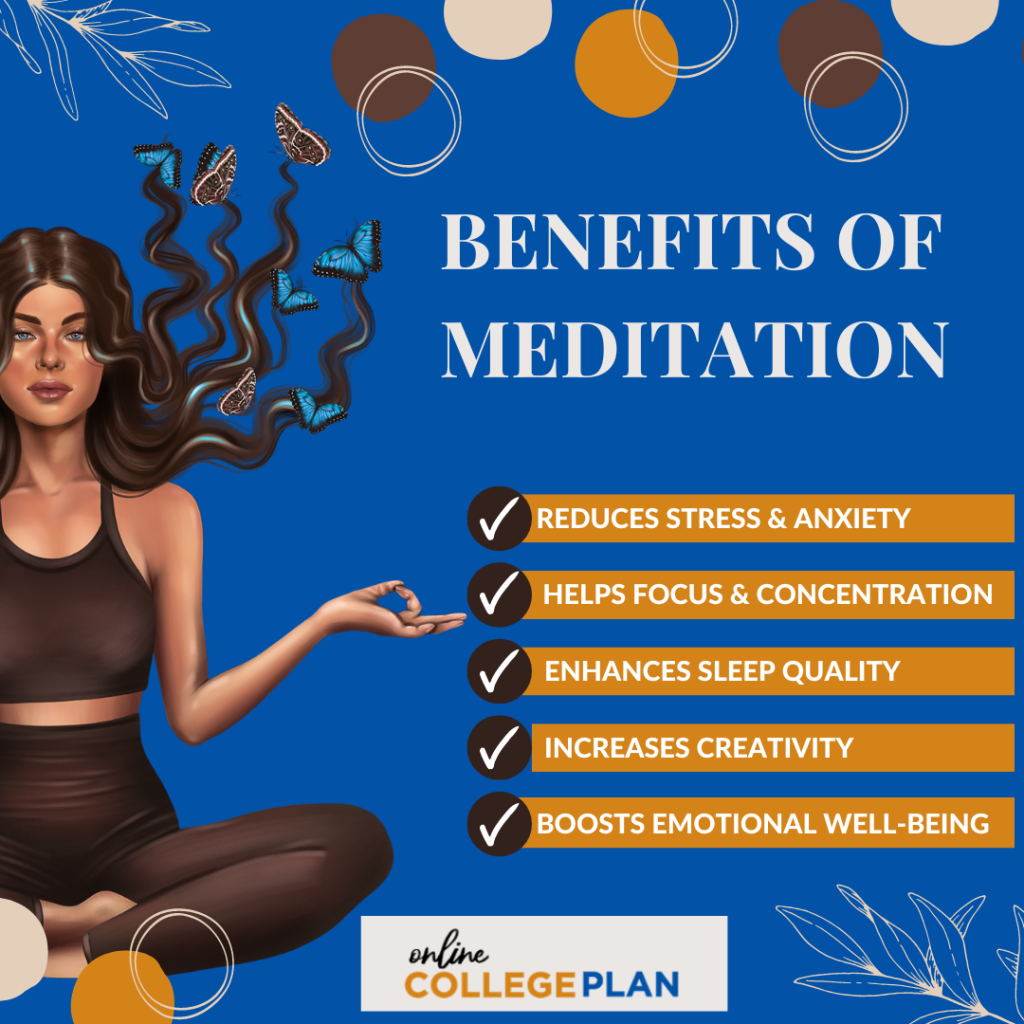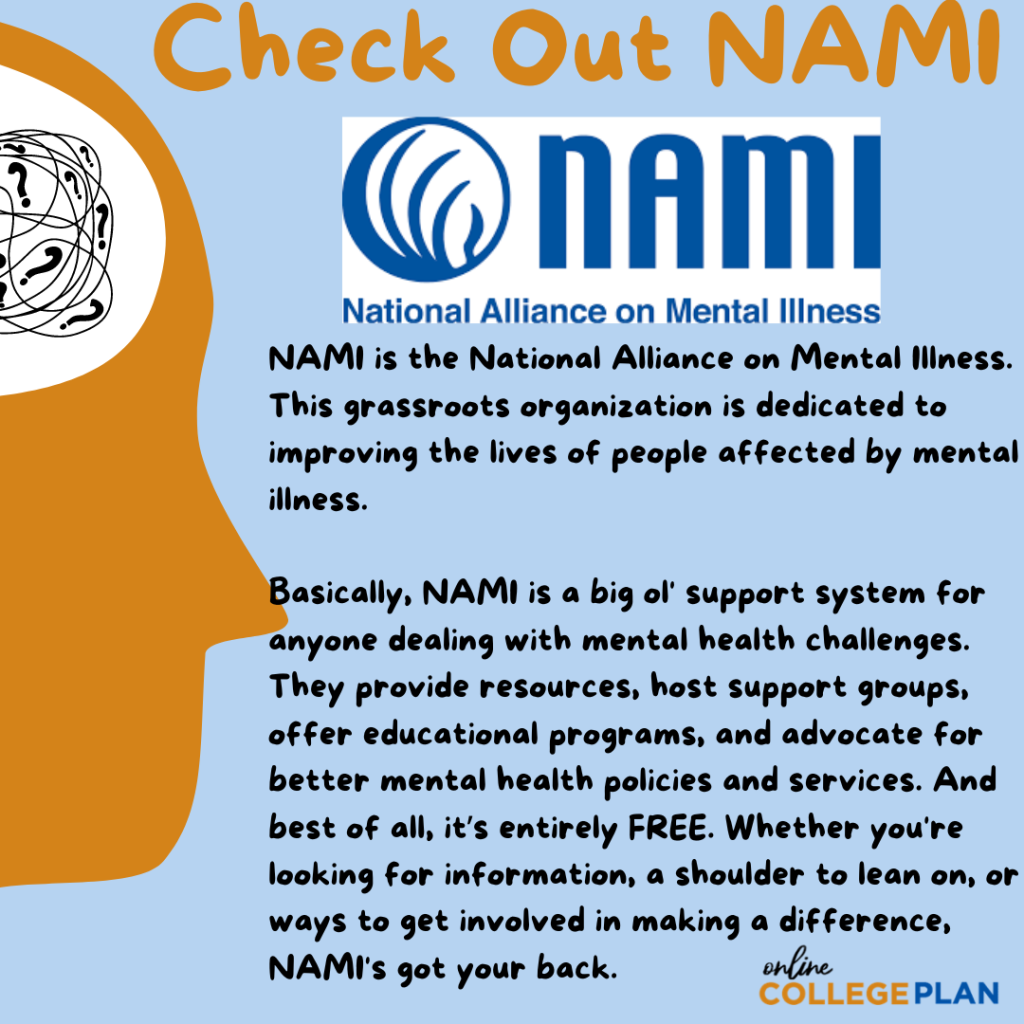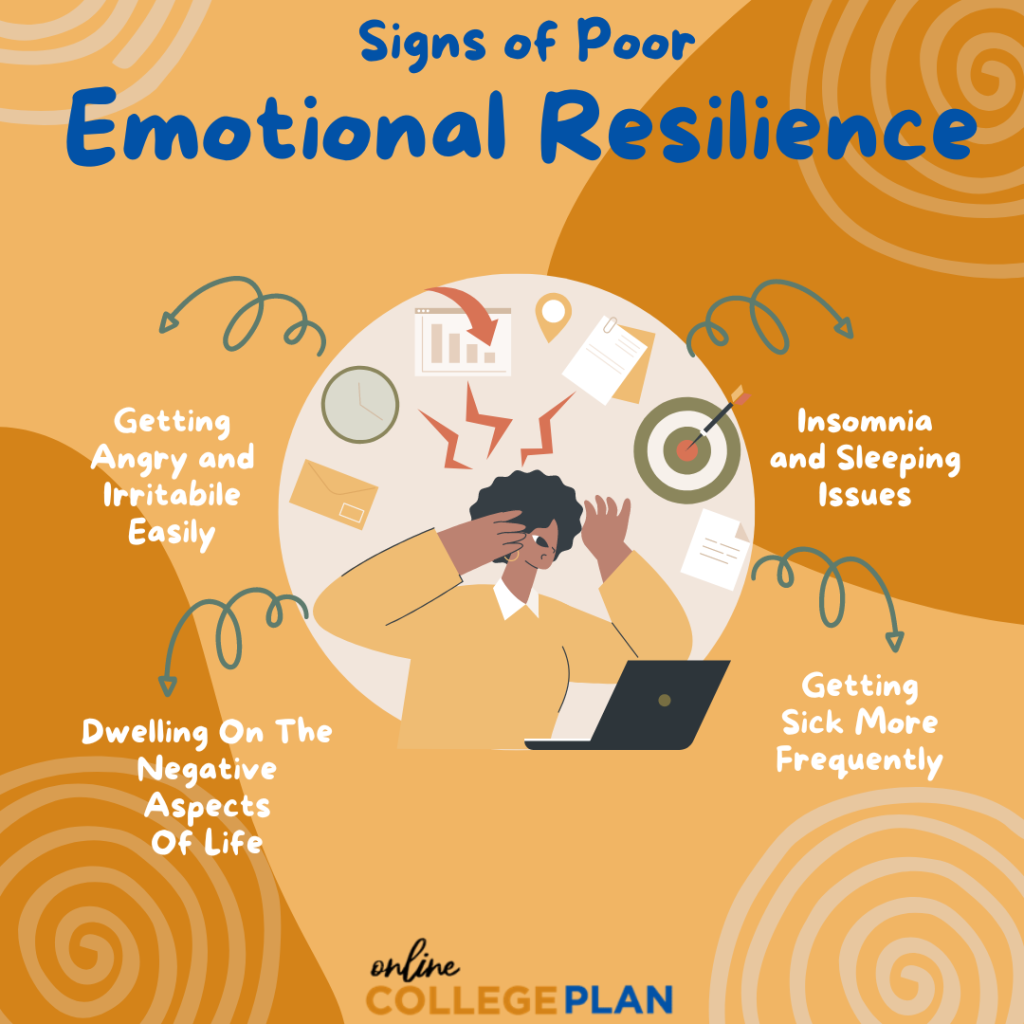Mindfulness for Students: College Stress Reduction Techniques
Find your degree

College is associated with new and exciting experiences and personal growth—not to mention your fantastic academic achievements! But it’s also a significantly taxing time for a lot of students. The whole deal of trying to ace your classes, fit in socially, and figure out this whole independence thing can pile on the pressure. And that can lead to some serious stress. If you’re feeling overwhelmed, this article on mindfulness for college students will give you some easy tips for stress reduction.
We’re not just talking about deep breathing exercises here—although we’ll touch on those, too. We’re going to give you college stress reduction techniques and some easy, practical, and totally doable ways to calm down, chill out, and enjoy your life at college. If you’re ready to start feeling better TODAY, dig in.
Mindfulness for College Students: What Is It?
You’ve heard of mindfulness before—this oft-overused buzzword of the new age. It’s like the kale of the wellness world. Everyone’s talking about it, but do we really know what it is? It’s supposed to make you all zen, present, and chill, but let’s be real—most of us are just trying to remember where we left our keys.
So, what is this mindfulness thing anyway? It’s a practice rooted in ancient Buddhist traditions that has become more popular in recent years. Its prevalence is due to its ability to help cultivate a sense of calm and increase your overall well-being. The good news is that you don’t have to be a meditation expert or spend hours sitting on a cushion to incorporate mindful practices for students into your daily routine.
Does Mindfulness Work?
Alright, so does mindfulness actually work, or is it just another one of those wellness fads? Well, here’s the deal: it’s not some magic potion that’ll solve all your problems overnight. If it were that easy, we’d all be floating on clouds by now, right?
But there’s some solid science backing this mindfulness stuff. It’s like a workout for your brain. It helps you chill out, improve focus, and deal with stress like a boss. And even though it might look like “the next new thing,” people have been swearing by this practice for centuries. So, hey, give it a shot. It might not transform you into a zen master overnight, but if it can help ease your negative feelings even a little, it’s worth it, right?
Getting Started: Incorporating Mindfulness Practices Into Daily Life
There’s this whole misconception about mindfulness that you need a yoga mat, lessons, and a designated space and time. But that’s absolutely false.
Fundamentally, mindfulness is a simple concept. […] Mindfulness means paying attention in a particular way: on purpose, in the present moment, and nonjudgmentally.
Professor Jon-Kabat Zin, bestselling author of Wherever You Go, There You Are
So, what can you do to start practicing mindfulness for college students naturally in your daily life? There are literally hundreds of ways to do it. And the best part is you can choose the ones that work best for you. Most college students are busy. They don’t have time to spend hours in meditation practices. No problem. These quick and easy mindfulness exercises can give you big benefits even when you’re short on time.
Three to Five-Minute Mindfulness Activities
If you want to try out mindfulness for college students to see how it works for you, here are three excellent activities to start with. Each takes less than five minutes (although you can certainly take longer) and will give you a good overview of how to be in the present moment.
Five-Finger Breathing Technique
The first mindfulness activity we’ll focus on is one of the easiest. It’s called the Five Finger Breathing Technique. The beauty of this technique is that you can do it anywhere, anytime, with nothing but your own hands. It’s also super discreet, which makes it the perfect activity for stress management in college. So, the next time you feel anxious in class (or anywhere else), you can easily incorporate this activity into any scenario. Slowly trace the outside of the hand with the index finger, breathing in when you trace up a finger and breathing out when you trace down.
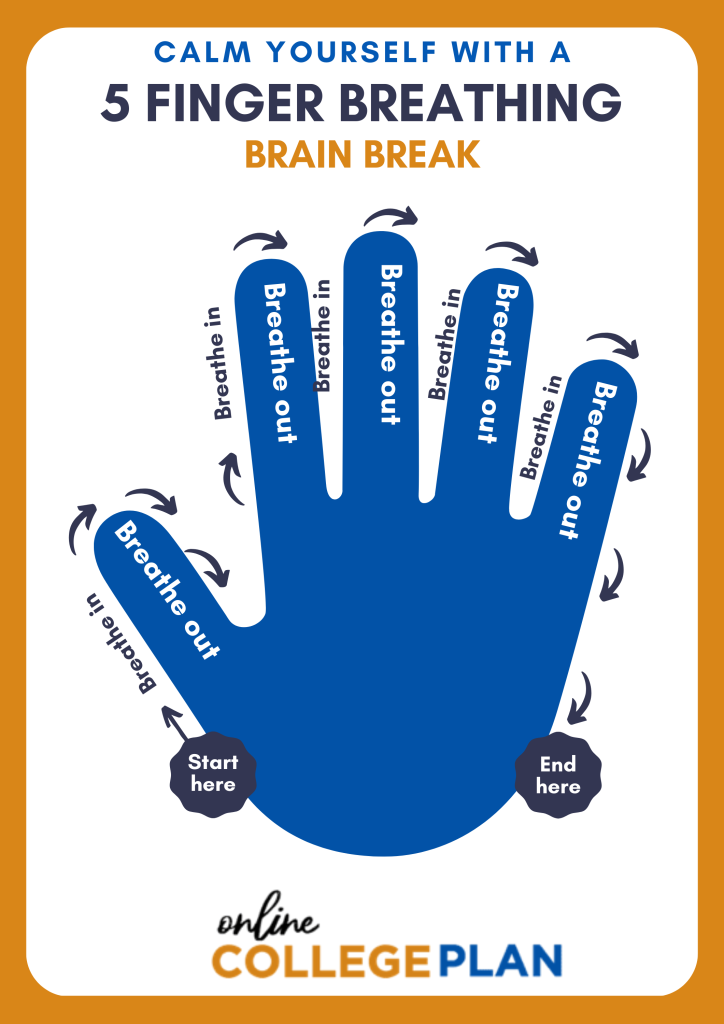
Mindfulness Grounding Technique
The next mindfulness exercise is also simple and easy to implement. If you find yourself forgetting the instructions, print them out and throw a copy into your backpack. Some students like to make several copies and actually fill in the answers to the questions, but it’s all up to you. This Mindfulness Grounding Technique is designed to explore your five senses and make you aware of your surroundings so you are focusing entirely on the present moment. In this exercise, you name three things you can observe from each of your senses.
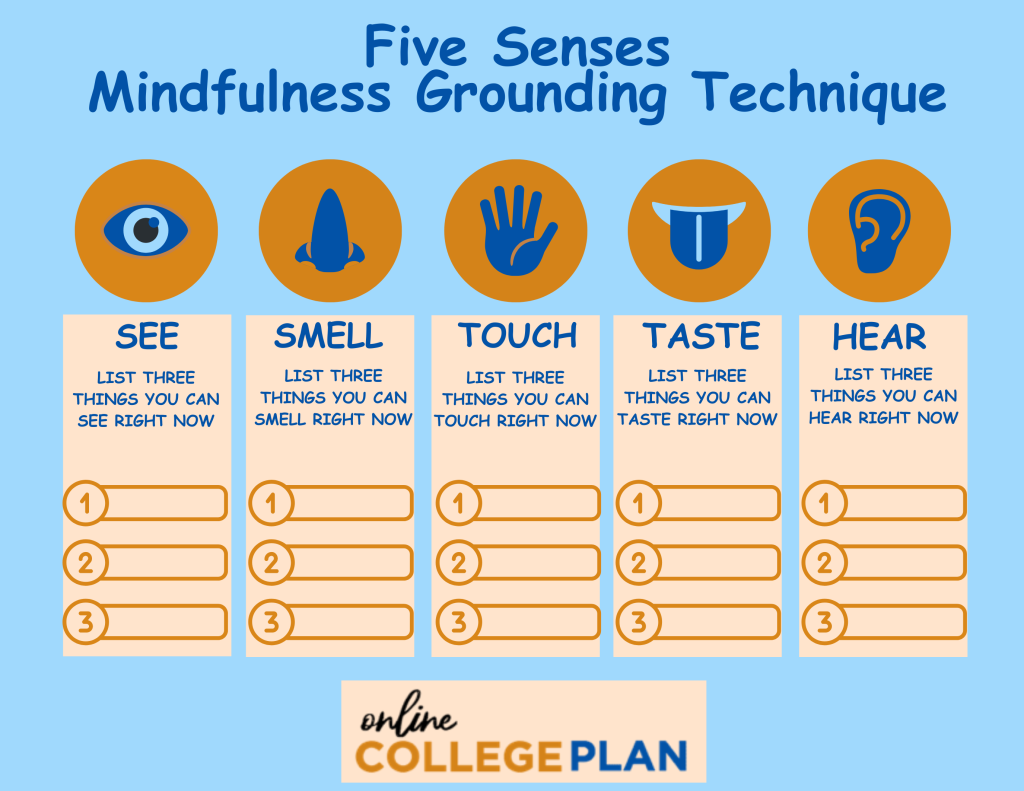
Body Scanning Technique
During body scanning, you start from the top of your head and slowly work your way down, paying attention to how each part of your body feels. It’s like giving yourself a mental massage without actually moving a muscle. You’re tuning in to any tension, tingling, or whatever’s happening in each area. It’s all about becoming aware of how you feel from head to toe. The body scan is a simple, sneaky way to unwind when you’re feeling stressed. So, give it a try and see if it helps you relax.
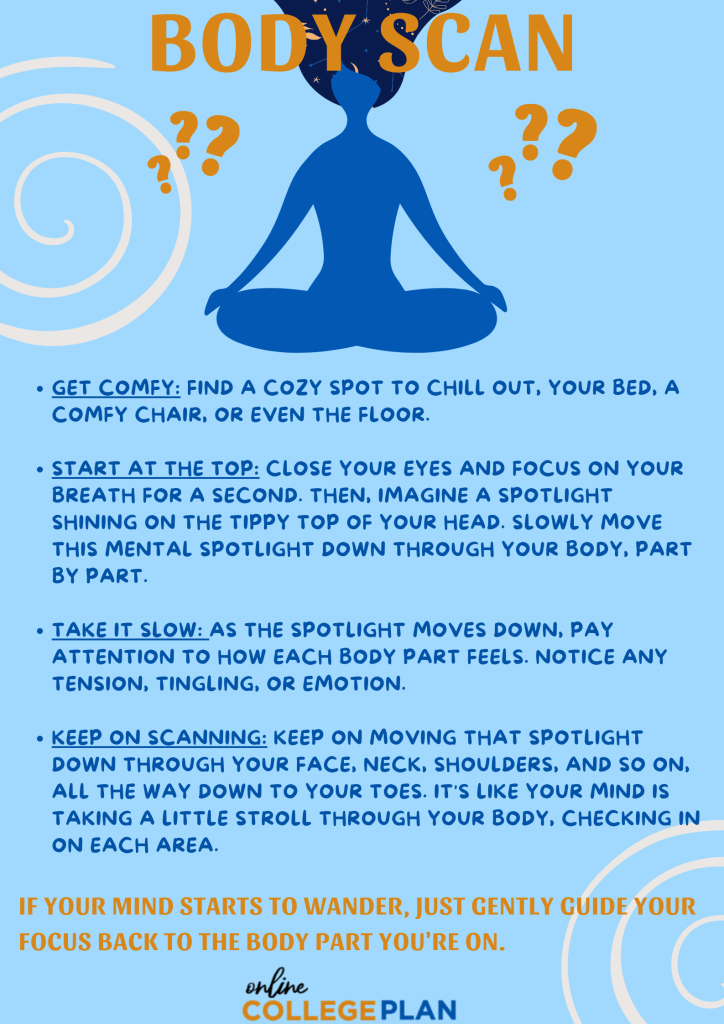
Adding mindfulness to your daily life doesn’t mean you have to flip your whole routine upside down. You can sneak it into your day by simply being present in whatever you’re up to. Whether taking a shower, hitting the books, or cooking a meal, try to tune in to what’s happening right then and there. Feel the water, smell the sizzlin’ spices, and listen to the sounds around you without judgment or distraction. You can turn any everyday activity into a little moment of chill.
Managing Stress Through Meditation and Relaxation Techniques
Now, let’s talk about meditation as a way to practice mindfulness for college students. Meditation can kick up your mindfulness game several notches. We know what you’re thinking—meditation is for gurus on mountaintops, right? Well, not exactly. It’s actually a handy tool for anyone, including stressed-out college students. You don’t need a fancy robe or a secret mantra to do it, and it can help hit the reset button on all that mental mayhem.
In meditation, I can let go of everything. … I’m just dipping into that powerful source that creates everything. I take a little bath in it.
Hugh Jackman
The Difference Between Meditation and Mindfulness
So, how is meditation any different than mindfulness? Alright, imagine your mind is like a new puppy—constantly running around, getting into things, and causing chaos. Meditation and mindfulness are like training that puppy to sit still and behave.
Meditation is like taking your puppy for a dedicated training session. You set aside some time, find a quiet spot, and focus on calming your mind. You can do this through techniques like focusing on your breath, repeating a calming phrase, or simply observing your thoughts without getting caught up in them. The goal is to cultivate inner peace, clarity, and awareness.
On the other hand, mindfulness is like applying the training you’ve given your puppy to everyday life. It’s about being fully present in the moment, whether you’re eating, walking, or talking to someone. It’s about paying attention to your thoughts, feelings, and surroundings without judgment. So, while meditation is like going to the gym for your mind, mindfulness is like flexing those mental muscles throughout the day.
Think of it this way—meditation is like practicing specific exercises to improve your mental fitness, while mindfulness is like incorporating those exercises into your daily routine to maintain that fitness level. Both are valuable tools for keeping your mind in shape and living a more fulfilling life.
How to Meditate
Meditation is not difficult, although at first, you might feel fidgety. College students aren’t used to slowing down and doing nothing. So, let’s break down meditation into simple steps:
- Find a Quiet Spot: First, pick a cozy corner where you won’t be disturbed. It could be your dorm room, a quiet park bench, or even just a comfy chair.
- Get Comfortable: Sit or lie down in a comfy position. You can cross your legs if you’re sitting or lie flat on your back—whatever feels good for you!
- Close Your Eyes (or Not): You can shut your eyes if you want to, but if that feels weird or uncomfortable, you can keep them softly focused on the floor in front of you.
- Take Deep Breaths: Start by taking a few deep breaths in through your nose and out through your mouth. Feel your chest and belly rise and fall with each breath.
- Focus Your Mind: Now comes the fun part. Try to focus your attention on one thing, like the feeling of your breath coming in and out, or a word or phrase you repeat in your head, like “peace” or “calm” (this is called a mantra).
- Notice Your Thoughts (But Don’t Get Caught Up): Your mind might start to wander, and that’s totally normal! When you notice your thoughts drifting away (maybe to that funny TikTok you saw earlier), gently bring your focus back to your breath or your chosen word.
- Be Patient: Meditation isn’t about having a totally empty mind (that’s pretty much impossible). It’s more about practicing bringing your attention back whenever it wanders. So, be patient with yourself – you’re doing great!
- Keep Going: Try to meditate for a few minutes at first, and then you can gradually increase the time as you get more comfortable with it. Aim for around 5 to 10 minutes to start.
- Finish with Gratitude: When you’re ready to wrap up, take a moment to think about something you’re grateful for – it could be as simple as a sunny day or a tasty snack. Let that warm, fuzzy feeling sink in.
It feels good. Kind of like when you have to shut your computer down, just sometimes when it goes crazy, you just shut it down and when you turn it on, it’s okay again. That’s what meditation is to me.
Ellen DeGeneres
How Guided Imagery Can Help Reduce Stress
Guided imagery is a relaxation technique and another type of meditation. It uses positive mental images to influence how you feel. It can enhance your traditional meditation practice or be used as a stand-alone strategy when you feel like you need extra help.
There are hundreds of free guided imagery videos on YouTube. So, finding some that are perfect for you will be a breeze. Here’s one of our favorites:
A few other top-rated guided imagery and meditation resources include:
- 15 Minute Guided Meditation | Strength & Grounding In Stressful Times
- 10-Minute Meditation For Anxiety
- 10-Minute Guided Meditation: Self-Love
- Discovering the Real You | A Guided Meditation for Inner Peace and Self-Discovery
Utilizing Campus Resources for Mental Health Support
At first glance, it would seem that campus life is a 24/7 adventure filled with endless parties and a casual lifestyle. However, this is simply not true. While college is exciting and fun, it can also feel like a mental health obstacle course. Many college students are struggling with their emotions and don’t know what to do. In this next section, we’ll discuss how you can get some help as one of the ways to practice Understanding mindfulness for college students will truly change your educational career. But first, have a look at these statistics so you know you aren’t alone in this:

Recognizing the Signs of Excessive Stress
Stress is a funny thing. It usually starts in your mind, but it also manifests in your body. When you experience too much stress, you might start feeling poorly. This can include all sorts of physical and mental symptoms.
Physical Symptoms of Too Much Stress
- Headaches
- Heart palpitations or fast heartbeat
- Feeling like you can’t breathe
- Stomach pain, nausea, or digestion problems
- Insomnia
- Lack of sex drive
- Rashes, eczema, psoriasis, or similar skin conditions
- Body aches
- Exhaustion
- Weight loss or weight gain
- A feeling of heaviness, like it’s just a massive effort to do anything
- Feeling generally unwell with no specific diagnosis
Emotional Symptoms of Too Much Stress
- Lack of concentration or focus
- Forgetting things more than usual, like certain appointments or classes
- Anxiety, nervousness, or feelings of overwhelming fear
- Substance abuse issues
- Depression
- Sadness and loneliness
- Hopelessness and despair
- Brain fog or feeling like you are “trying to think through mud.”
- Suicidal thoughts or compulsions to harm yourself
- Becoming fixated or obsessed with small details that otherwise would not affect you.
When physical symptoms of stress are ignored, they can get worse and cause more serious physical complaints. Yet emotional stress can sometimes wreak the most havoc on students, as they feel helpless to control their feelings, and things begin to spiral. That’s why knowing how to protect your health in school is vital. Check out our guide on staying physically and mentally well in college.
Where to Get Help
Too much stress doesn’t just weigh heavily on students’ minds; it can push them to a dark place, sometimes even making them think about giving up entirely.
I basically failed my senior year of undergrad because of severe depression. I went from straight A’s to never going to class and failing everything. I’m very fortunate that my student advisor recognized the problem (because I certainly didn’t), got together with the rest of my professors, and withdrew me from all my classes so I wouldn’t blow up my GPA.
Lcbtexas from the r/geologycareers community on Reddit
I almost checked myself into the psych ward, trying to keep my grades up. I was so stressed TF out that entire semester that I was losing my mind.
SweetTeaBags from the r/collegerant community on Reddit
I have a history of anxiety and last semester I had a lab that was so stressful I had stomach pains for weeks. After going to the clinic at school for those pains I went to the counseling center and set up appointments with a counselor and the doc there.
RedditUser145 from the r/college community on Reddit
College Campus Mental Health Resources
One great thing about mental health awareness is that most college campuses now have excellent support in place for dealing with life’s curveballs.
Student Counseling Center
First up, you’ve got the counseling center, which is your go-to spot for mental health support. These places are like havens staffed with people ready to listen. They offer everything from one-on-one counseling sessions to group therapy to workshops on taming stress and getting your zen on.
Student Health Center
Then there’s the student health center or clinic. While it’s mainly for your physical health needs, many places also offer mental health services. You can chat with medical pros who might prescribe something to take the edge off. Or they might hook you up with counselors who can provide top-notch therapy sessions.
Student Groups
Finally, let’s not forget about the student groups on campus that are all about mental health. There are other students just like you who create safe spaces where you can chat about what’s on your mind, swap tips and resources, and just vibe with folks who get it. Going to their meetups and events is an excellent idea. Some even meet online. It’s a terrific way to make new friends who get where you’re coming from.
Don’t see a group that caters to your specific needs? If you’re up to it, you can start one yourself and be a pioneer for mental health on campus.
What if Your Campus Doesn’t Have the Mental Health Resources You Need?
If you’re stuck on a campus without proper mental health resources, it can feel like hitting a brick wall. It’s discouraging. But there are still ways to get the support you need:
Look Local: Check out what’s around your town or city. There might be counseling centers, clinics, or support groups nearby that can help. Your college might even have connections with local providers or ways to help you get there.
Lean on Loved Ones: Reach out to friends, family, or a trusted professor. Sometimes, just talking to someone who cares can lighten the load.
Speak Up: If you’re feeling brave, consider pushing for better mental health resources on campus. Chat with student groups or staff about what’s missing and how things could improve.
DIY Help: While it’s not the same as pro support, there are things you can do to ease the strain. Try out the relaxation techniques we’ve suggested. And find ways to cope that work for you.
Go Digital: The internet’s your friend here. There are loads of online resources, from therapy apps to chatrooms, where you can find support and advice without leaving your room. Here are a couple of starting points:
Time Out: If things are really tough, don’t be afraid to take a break from college. It’s okay to hit pause and focus on getting back on track mentally.
Remember, you’re not alone, even if it feels that way. It’s okay to ask for help, and there are people and resources out there ready to support you, even if they’re not immediately available on campus. You deserve to prioritize your mental health and well-being, so don’t hesitate to take the steps necessary to get the support you need. You deserve it!
Establishing Healthy Boundaries and Self-Care Habits
At college, it’s easy to become overwhelmed and neglect our own boundaries. But it’s actually a time when we need them the most. This phrase gets thrown around a lot, but what exactly does it mean?
What are Boundaries?
Imagine you have your very own invisible bubble around you. This bubble is super special because it’s all about YOU—your likes, dislikes, and what makes you feel comfy or not so comfy.
Boundaries are like the lines you draw around your bubble to say, “Hey, this is me, and here’s what’s okay and what’s not okay.” It’s kind of like having your own personal rules to keep you feeling safe and happy.
Boundaries allow us to protect our physical, emotional, and mental well-being. But here’s the thing: As kids, our parents protected (or at least were supposed to protect) our boundaries. Ideally, they helped us learn about how to set healthy boundaries. But parents aren’t perfect. And now that you’re an adult, the responsibility for creating and sticking to your boundaries falls on you.
Okay. First and foremost, setting boundaries means we recognize our limitations and learn to communicate them effectively to others. It also means saying no when we need to. This means not overcommitting ourselves and understanding that it’s okay to prioritize our well-being above making other people happy. It’s tough to do sometimes, but setting healthy boundaries is a huge part of emotional intelligence. And by doing it, you can avoid burnout and ensure you have the energy to focus on your needs.
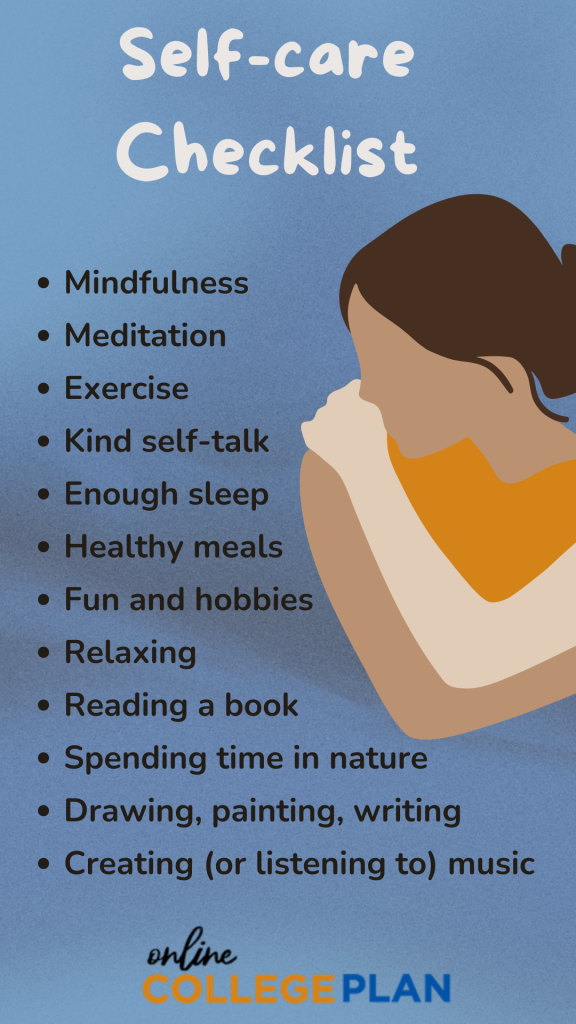
Self-Care in College
Self-care isn’t a luxury; it’s a necessity. Self-care activities nurture and restore us and are vital for maintaining balance. They can include simple acts such as taking breaks, practicing mindfulness, engaging in hobbies you enjoy, or prioritizing regular exercise and healthy eating. We all need to carve out time for things that make us happy and bring us joy.
Remember, self-care is an ongoing gig. Become aware of what you need, show yourself some love, and stick to the plan. By doing so, you can build a life that’s all about supporting your well-being. And in doing this, you’ll be able to rock it in your personal and academic world.
It’s not selfish to love yourself, take care of yourself, and to make your happiness a priority. It’s necessary.
Mandy Hale
Building Resilience for Navigating Challenges
Resilience refers to the ability to adapt and bounce back from setbacks, stress, and adversity. It involves developing a strong sense of self-awareness, managing emotions effectively, and maintaining a positive outlook, even in the face of difficulties. Emotional resilience is a tool that can help you navigate the ups and downs that come with college life.
Strengthening your emotional resilience during college will help you thrive academically. But it will also enhance your personal growth and mental well-being. In this last section, we will explore practical techniques to assist you in developing resilience.
Why Is Emotional Resilience So Important for College Students?
Emotional resilience is important for everyone. But it’s an especially big deal for calling students due to the fact that they are dealing with constant stress and change. Resilience is like having a superpower shield to help you cope with things like:
The academic hustle
College means more work, more deadlines, and more pressure. Emotional resilience will help you stay cool, focused, and balanced as you juggle all those study demands.
Personal and relationship drama
College life is all about making new friends, dealing with conflicts, and maybe even navigating romantic relationships. Emotional resilience gives you the skills to handle all these social ups and downs, communicate like a pro, and work through disagreements with grace.
Adjusting to a new scene
Starting college often means leaving behind your old stomping grounds and diving into a whole new world. Emotional resilience helps you roll with the changes, deal with the unknowns, and feel more at home as you find your place in this fresh environment.
Transitioning to independence
Last but not least, there’s the whole independence gig. College is where you’re expected to start making more of your own choices and taking charge of your life. Emotional resilience gives you the strength to make smart decisions, handle new responsibilities, and embrace the freedom that comes with this phase of life.
Now that we have explored its significance in college, let’s move on to practical strategies for building a solid foundation of emotional resilience.
Building a Strong Foundation for Emotional Resilience in College
| Build Your Crew | Surround yourself with friends, family, and mentors who’ve got your back when the going gets tough. A support network of people you can lean on makes all the difference. |
| Take Me-Time Seriously | We talked about this before, but it’s that important. Make sure you’re looking after number one by doing stuff that makes you feel good—whether it’s hitting the gym, chilling with a hobby, or just catching enough Zs. Self-care is key! |
| Keep Goals Real | Break down your big dreams into bite-sized chunks. That way, you’ll be less overwhelmed and will experience that sweet feeling of achievement along the way. |
Develop Coping Strategies | We’ve given you many ways to start coping more effectively with stress, such as deep breathing exercises, mindfulness, meditation, and more. Use the ones that work best for you, and seek professional help when you need it. |
| Prioritize Time Management | Get smart about managing your time. Use planning apps, prioritize your to-dos, and don’t leave everything till the last minute. Good time management means less stress and more time for relaxation, which can contribute to emotional resilience. |
| Look on the Bright Side | Try to stay positive and see the silver lining, even when things get rough. Focus on being grateful for the good things in your life and keep pushing forward. Hint: a gratitude journal is a great way to practice this step. |
Practice Assertiveness | Learn to speak up and communicate your needs, boundaries, and opinions in a respectful manner. These skills will help you avoid drama while still ensuring your needs are met. |
Seek Meaning and Purpose | Connect with the things that give your life meaning, whether it’s a passion project, a cause you care about, or just spending time with the people who matter most. Having a purpose can keep you going when things get rough. |
Fail Forward | Don’t sweat it when things don’t go to plan. Instead, use setbacks as learning opportunities. Every stumble is a chance to grow and kick butt next time. |
Building emotional resilience in college is a vital skill that will benefit you throughout your academic and personal life. By using the techniques discussed in this college student wellness guide, you can thrive in school and overcome obstacles that might normally derail you. Remember, building up your resilience is a marathon, not a sprint. Keep practicing, and you’ll be crushing college life and whatever else comes your way. Understanding mindfulness for college students will truly change your educational career. You’ve got this!
Questions and Answers About College Stress Reduction Techniques
Absolutely. Mindfulness and meditation are great for getting centered in the present moment and easing worries about the future or past regrets. They’re known to dial down cortisol levels, that pesky stress hormone, promoting a sense of relaxation. Plus, sticking with mindfulness can sharpen focus and boost academic performance, which definitely helps keep stress at bay.
Techniques like deep breathing, progressive muscle relaxation, and visualization can help ease muscle tension and promote calmness. They help relax your body and mind, and the best part is that you can do them anywhere, anytime, for quick relief. These activities can also improve overall well-being and resilience to stress, so you get better over time.
Talking to a mental health pro can be a game-changer when stress feels like too much. If you’re feeling so overwhelmed you can’t function, definitely reach out to your campus health resources. But you don’t need to wait for a full-blown mental health crisis to get some help. These places offer a safe space to explore the causes of stress and develop healthy coping mechanisms. And sometimes, they might suggest meds to help you manage better if things get really tough.
For sure. Working out releases feel-good endorphins, which can lift your mood and ease tension. Regular exercise also means better sleep, which is crucial for kicking stress to the curb. Plus, finding a sport or activity you enjoy can be a nice break from stress, giving you a chance to unwind.
Definitely. A balanced diet can help keep your mood stable and your energy levels steady, which can make a big difference when it comes to stress. Steer clear of too much caffeine and sugar to avoid energy crashes that can make things worse. Drinking enough water and munching on brain-boosting foods like omega-3s and vitamins can help keep you focused and calm under pressure.
Skipping out on sleep can really ramp up stress levels, messing with your brain, mood, and overall health. But sticking to a consistent sleep schedule helps regulate your body’s internal clock, leading to better sleep quality. And we all know better sleep means better stress management.
Having people to lean on can make a huge difference when stress hits. Chatting with friends or family about what’s bothering you can help lighten the load. Plus, spending time with others doing fun stuff can take your mind off stress. Feeling connected and supported can also help prevent that overwhelming feeling of being alone in all the stress.


